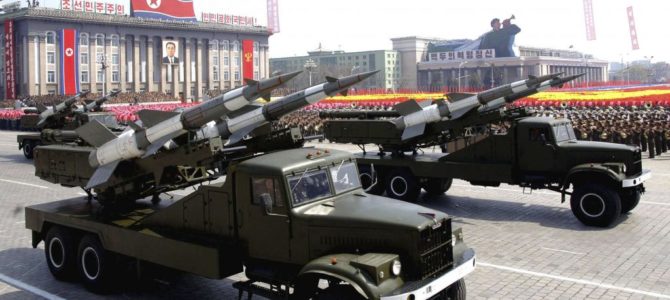
Most discussions of the brewing crisis in North Korea have focused on China’s cooperation or obstruction, and rightly so. China accounts for the vast majority of North Korea’s foreign trade and military aid, and is Pyongyang’s most visible booster on the world scene. Conspicuously missing, however, is significant mention of the country that bears a large share of the blame for the current crisis and could play a crucial role in the future: Pakistan.
Our alleged “allies” to the east of Afghanistan have long boosted the North Korean Kim dynasty militarily, economically, and politically. The most visible symbol of Pakistani assistance is, of course, its chief nuclear physicist Abdul Khan, whose trips to Pyongyang in the early 2000s helped the North develop nuclear weapons. When Khan’s activities — which included shipping centrifuges to North Korea — were discovered by U.S. intelligence, he was paraded in front of Pakistani TV cameras to confess the unilateral nature of his crimes, sentenced to house arrest in a luxurious villa, and pardoned in full shortly thereafter.
This Isn’t a Recent Development
Pakistan’s support of North Korea began nearly three decades before the Khan episode, however, and has continued (albeit more subtly) in the years after. Pakistan and North Korea have cooperated extensively on missile development and nuclear technology since the mid-1970s. During the Clinton administration, Pakistan traded “civilian nuclear technology” to Pyongyang in exchange for shipments of North Korea’s Rodong medium-range missiles capable of carrying newly developed Pakistani warheads.
Around the same time, Pakistan was one of only two nations on the United Nations Security Council that refused to condemn the North’s withdrawal from the nuclear non-proliferation treaty. Today, Pakistan maintains closer diplomatic relations with Pyongyang than any other country does besides China. The Kim regime has an embassy in Islamabad and a consulate-general in Karachi dedicated to “economic and commercial affairs.” Given the lengthy work-camp sentences handed out to anyone caught fleeing the Democratic People’s Republic, it seems highly unlikely that the outpost exists to help North Korean tourists who lost their passports while visiting Karachi.
Pakistan’s incentive to prop up North Korea has only increased in recent years, for several reasons. The first reason is straightforward geopolitics: India and South Korea have formed closer ties since 2015, including several new bilateral trade deals and a “special strategic partnership” on foreign policy. Because Islamabad views anything bad for India as, by definition, good for Pakistan, it has little to lose and much to gain from helping North Korea consume the resources and attention of India’s allies.
Second, Pakistan has an incentive to piggyback on rapid technological advances from Pyongyang. Pakistan’s nuclear program is less sophisticated than India’s, and it may view Pyongyang’s research as useful to its own modernization efforts. Regime change or unification, by contrast, would deprive Pakistan of a reliably willing weapons vendor if President Hussain’s government finds itself internationally isolated like it was in the 1990s.
Third, Pakistan profits from the international community’s preoccupation with North Korea. If the Korean crisis is resolved, the focus of non-proliferation efforts will turn to the India-Pakistan conflict and subject the Pakistani government’s own malfeasance to greater scrutiny.
The Countries’ Trade and Military Ties Are Deep
Pakistan has provided more than just technical support to North Korea, however. It is also one of the largest importers of North Korean goods. Although the volume of trade between the two countries is small by international standards, it is significant when considered in light of reports that North Korea’s entire nuclear budget may be as little as $1.1 billion.
In addition to trade, Pakistan has also provided a strategic blueprint for North Korea. In fact, North Korea’s regional strategy mimics longstanding Pakistani practices in Southwest Asia. The two countries have more in common than tin-pot dictators and advanced homespun shirt industries: In 1947, Pakistan became an independent nation, carved from its larger, wealthier, and stronger neighbor India.
Unable to achieve conventional military parity against its arch-enemy, Pakistan has used threats of nuclear war, aggressive posturing, and destabilizing operations to project strength above its weight class — with remarkable success. Its military regularly threatens to nuke India (last January, last October, and last September, for example) and uses the resulting uncertainty about its intentions as a protective umbrella for state-sponsored terrorism and border skirmishes with its neighbors. Sound familiar?
Although China is undoubtedly still the thousand-pound gorilla at the negotiating table, and some of Pakistan’s support for North Korea has likely been motivated by its desire to curry favor with Beijing, Islamabad has independent interests at stake as well. Any comprehensive approach to containing or neutering North Korea must account for those interests and for Pakistan’s proven willingness to use international meddling to further them.
Conversely, Pakistan’s support could be crucial to the international community’s containment efforts if it can be cajoled into cooperating. It could, for example, provide details about the North-Korean rockets in its storehouses, or make Khan (whom the CIA has never been permitted to interview) available to Western intelligence services. As one of the few men to work on the North Korean nuclear program and leave the country alive, Khan possesses a wealth of inside knowledge about the scientists, facilities, and dynamics inside the reclusive nation.
Either way, whether Pakistan acts as friend or foe, strategies that ignore Islamabad’s influence on the North Korean crisis are missing an important factor.









